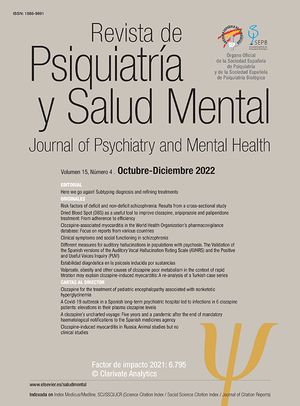Identifying affective temperaments could be useful both for understanding the normal behavioral variations in the general population and to establish if there is a clinical predisposition to certain disorders. Five affective temperaments have been proposed: depressive, cyclothymic, hyperthymic, irritable and anxious. Original instrument for measuring them (TEMPS-A) is a 110-item scale but many short versions in different languages have been validated. The aim of this study was to obtain a short self-administered Spanish version of TEMPS-A with good psychometric properties.
Materials and methodsA sample of 550 students who answered the argentinean version of TEMPS-A was included, after psychometric analysis a comparison between inpatients with major depression and their matched controls by sex and age who answered the brief version was performed to get an external validation.
ResultsThe sample was composed by 298 (54.2%) women. The mean age was 23.3 year (SD=6.2). A forced five factor analysis was performed. The 7 items with the highest factorial load (more than 0.350) for each subscale were included in the brief version. The Cronbach alpha's ranged from 0.690 to .800. The most prevalent temperament was hyperthymic followed by cyclothymic for students sample. Similarities between students and controls sample were observed, but not with patients with major depression.
ConclusionsThis brief Spanish version of TEMPS-A (35 items) has good psychometric properties and can be used in general and clinical population.
Identificar los temperamentos afectivos podría ser útil tanto para comprender las variaciones conductuales normales en la población general como para establecer si existe una predisposición clínica a determinados trastornos. Se han propuesto 5 temperamentos afectivos: depresivo, ciclotímico, hipertímico, irritable y ansioso. El instrumento original para medirlos es TEMPS-A, una escala de 110 ítems, pero se han validado muchas versiones cortas en diferentes idiomas. El objetivo de este estudio fue obtener una versión corta en español autoadministrada de TEMPS-A con buenas propiedades psicométricas.
Materiales y métodosSe estudió una muestra de 550 estudiantes que respondieron la versión argentina de TEMPS-A. Después del análisis psicométrico, se comparó entre pacientes hospitalizados con depresión mayor y sus controles, emparejados por sexo y edad, que respondieron la versión breve, para obtener una validación externa.
ResultadosLa muestra estuvo compuesta por 298 (54,2%) mujeres y 252 (45,8%) hombres. La edad media fue de 23,3 años (DE = 6,2). Se realizó un análisis forzado de 5 factores. En la versión breve se incluyeron los 7 ítems con mayor carga factorial (>0,350) para cada subescala. El alfa de Cronbach osciló entre 0,690 y 0,800. El temperamento más prevalente fue el hipertímico, seguido del ciclotímico, para la muestra de estudiantes. Se observaron similitudes entre la muestra de estudiantes y controles, pero no con pacientes con depresión mayor.
ConclusionesEsta versión breve en español del TEMPS-A (35 ítems) tiene buenas propiedades psicométricas y puede ser utilizada en población general y clínica.
Artículo
Comprando el artículo el PDF del mismo podrá ser descargado
Precio 19,34 €
Comprar ahora










